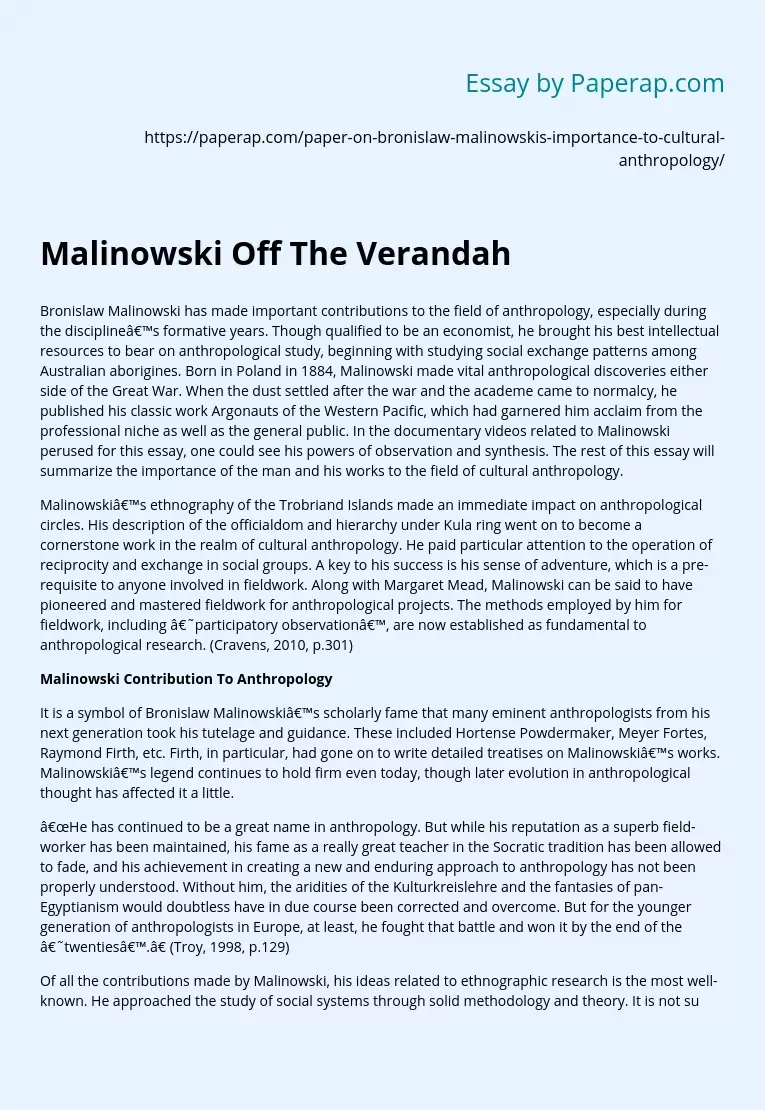Malinowski Off The Verandah
Bronislaw Malinowski has made important contributions to the field of anthropology, especially during the discipline’s formative years. Though qualified to be an economist, he brought his best intellectual resources to bear on anthropological study, beginning with studying social exchange patterns among Australian aborigines. Born in Poland in 1884, Malinowski made vital anthropological discoveries either side of the Great War. When the dust settled after the war and the academe came to normalcy, he published his classic work Argonauts of the Western Pacific, which had garnered him acclaim from the professional niche as well as the general public.
In the documentary videos related to Malinowski perused for this essay, one could see his powers of observation and synthesis. The rest of this essay will summarize the importance of the man and his works to the field of cultural anthropology.
Malinowski’s ethnography of the Trobriand Islands made an immediate impact on anthropological circles. His description of the officialdom and hierarchy under Kula ring went on to become a cornerstone work in the realm of cultural anthropology. He paid particular attention to the operation of reciprocity and exchange in social groups. A key to his success is his sense of adventure, which is a pre-requisite to anyone involved in fieldwork. Along with Margaret Mead, Malinowski can be said to have pioneered and mastered fieldwork for anthropological projects. The methods employed by him for fieldwork, including ‘participatory observation’, are now established as fundamental to anthropological research. (Cravens, 2010, p.301)
Malinowski Contribution To Anthropology
It is a symbol of Bronislaw Malinowski’s scholarly fame that many eminent anthropologists from his next generation took his tutelage and guidance.
These included Hortense Powdermaker, Meyer Fortes, Raymond Firth, etc. Firth, in particular, had gone on to write detailed treatises on Malinowski’s works. Malinowski’s legend continues to hold firm even today, though later evolution in anthropological thought has affected it a little.
“He has continued to be a great name in anthropology. But while his reputation as a superb field-worker has been maintained, his fame as a really great teacher in the Socratic tradition has been allowed to fade, and his achievement in creating a new and enduring approach to anthropology has not been properly understood. Without him, the aridities of the Kulturkreislehre and the fantasies of pan-Egyptianism would doubtless have in due course been corrected and overcome. But for the younger generation of anthropologists in Europe, at least, he fought that battle and won it by the end of the ‘twenties’.” (Troy, 1998, p.129)
Of all the contributions made by Malinowski, his ideas related to ethnographic research is the most well-known. He approached the study of social systems through solid methodology and theory. It is not surprise then that one of the documentary films about his life and work is titled ‘Off the Verandah’, for he brought anthropology off the veranda and got knee-deep in fieldwork. In other words, the hands-on approach to studying cultural anthropology is one of his most valued contributions. He emphasized the importance of such ‘detailed participant observation’ for understanding distant cultures and social systems. He inspired a whole generation of anthropologists through these insightful and inspiring lectures. After his appointment as a lecturer in Social Anthropology in 1922, he gave a series of short courses on such topics as ‘Early Beliefs and Social Differentiation’, ‘Social Organization of Australian Aborigines’, and ‘Economics of Primitive Peoples’. His seminar on Primitive Mentality ranks as equally important. His importance as a cultural anthropologist is further affirmed by the fact that he travelled far and wide in the European Continent giving lectures in Geneva, Vienna, Rome, Oslo, etc. His legacy and pre-eminence is registered by his appointment to a Readership in Anthropology in the University of London in 1924. Malinowski’s further intellectual exploits included his participation in the New Education Fellowship Conference in South Africa in 1934. Further, “from July till October he toured in South and East Africa, visiting his students in the field and doing anthropological survey work among the Swazi, Bemba, Chagga, Masai, Kikuyu, and Maragoli peoples.” (Firth, 1957, p.114)
Malinowski’s influence in his science was also due to the impact of his personality. His was a complex personality, highly intelligent, cultured, and gifted in most things with a fine degree of sensitivity. Almost more than anything else,
“Malinowski was a great teacher. He drew to him students from all over the world, and from a variety of branches of knowledge. It was also one of the reasons for his influence in helping to make anthropology a subject more accessible to non-specialists interested in social questions of a theoretical as well as a practical order… Too easily he sought universal, not specific comparison. But it did help to give people in other disciplines the sense that anthropology shared with them a common purpose, a common field of human behaviour, a similar kind of generalization; that they could latch into it at a number of points in a significant, dynamic way. But to return to his relations with his students, to whom, above all, he opened the doors of the mind.” (Firth, 1957, p.114)
Works Cited
Cravens, Hamilton. “What’s New in Science and Race since the 1930s?: Anthropologists and Racial Essentialism.” The Historian 72.2 (2010): 299+.
Documentary Films related to Bronislaw Malinowski, retrieved from
Firth, Raymond, ed. Man and Culture: An Evaluation of the Work of Bronislaw Malinowski. New York: Humanities Press, 1957.
Troy, Timothy. “Professor Bronislaw Malinowski’s Visit to Tucson.” Journal of the Southwest (1998): 129.
Malinowski Off The Verandah. (2019, Dec 05). Retrieved from https://paperap.com/paper-on-bronislaw-malinowskis-importance-to-cultural-anthropology/

